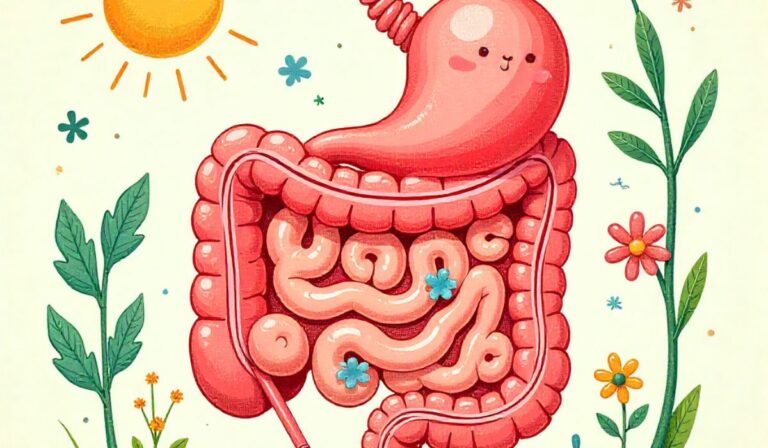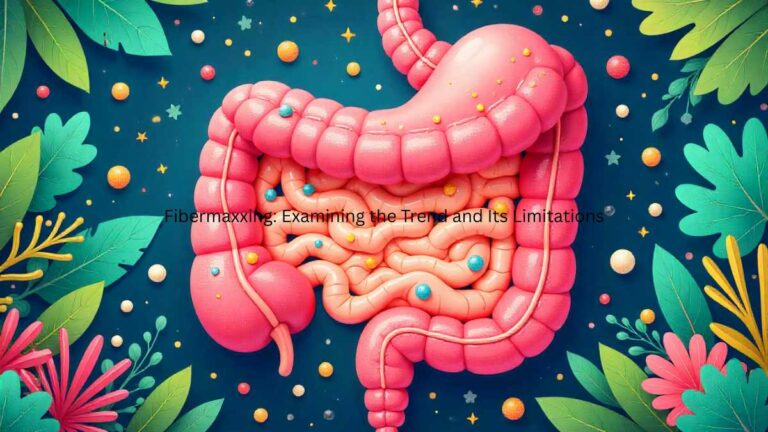10 Ways to Boost Gut Health Naturally and Effectively
Key Takeaways
- Discover practical lifestyle adjustments to enhance gut health.
- Learn about the impact of stress and sleep on your digestive system.
- Understand how to incorporate prebiotics and probiotics into your routine.
- Explore the benefits of mindful eating for improved digestion.
- Find simple strategies to support your gut without diet changes.
- Gain valuable tips to promote a balanced gut microbiome and overall wellness.
Do you ever feel a little…off? Like your stomach is sending you mixed signals, even though you’re eating what you always do?
Many people struggle with their gut health, experiencing bloating, irregular bowel movements, or just a general feeling of discomfort.
The good news is, you don’t always need a major diet overhaul to improve things! This post reveals 10 Ways to Boost Gut Health without completely changing your eating habits, making it easier than ever to feel your best.
You’ll explore simple, practical strategies to improve your digestive system. Ready to discover how to create a happier gut and feel amazing?
Get ready to explore natural methods that can make a big difference, helping you gain a more comfortable, balanced life.

The 10 Natural Gut Health Boosters
Improving your gut health doesn’t necessarily mean overhauling your entire life. Often, small changes can lead to big improvements in how you feel.
This list explores simple and effective techniques to support your digestive system without completely altering your diet.
These techniques focus on aspects like stress management, hydration, and mindful eating. The goal is to provide accessible strategies to promote a balanced gut microbiome, which is essential for overall well-being.
By incorporating these 10 Ways to Boost Gut Health, you can create a more comfortable and balanced life.
1. Prioritize Adequate Sleep
Sleep is a fundamental pillar of overall health, and its impact on your gut is significant. During sleep, your body performs essential repair and restorative functions.
When you’re sleep-deprived, the delicate balance of your gut microbiome can be disrupted. This imbalance can lead to inflammation and other digestive issues.
Think of sleep as a reset button for your body, including your gut. Aim for 7-9 hours of quality sleep each night to help your gut function optimally.
Regular sleep patterns also influence hormone production, which directly impacts your gut health, further underlining the importance of rest for a healthy digestive system. Prioritizing sleep is the basis for a healthy gut.
- Rest and Recovery: During sleep, the gut’s cells repair and regenerate. Poor sleep hinders this process. This can lead to increased gut permeability, often described as “leaky gut,” where substances leak into the bloodstream causing inflammation and discomfort. A recent study found that individuals who consistently got less than 6 hours of sleep per night showed a significantly different gut microbiome composition compared to those who got 7-9 hours. This demonstrated the crucial role of adequate rest for a balanced gut.
- Stress Hormone Regulation: Sleep helps regulate cortisol, the stress hormone. High cortisol levels can harm your gut. A study published in the journal “Sleep” reported that inadequate sleep elevated cortisol levels, leading to increased gut inflammation and impaired digestive function. Practicing consistent sleep patterns helps to calm the nervous system.
- Circadian Rhythm Alignment: Regular sleep schedules align your circadian rhythm, which helps regulate digestive processes. Research suggests that maintaining a consistent sleep-wake cycle helps the gut microbiome thrive. Inconsistent sleep patterns, such as those caused by jet lag or rotating work shifts, can negatively affect gut health, leading to digestive issues and altered metabolism.
2. Manage Your Stress Levels
Stress is a common factor that can significantly impact your gut health. When you’re stressed, your body releases hormones like cortisol, which can disrupt the delicate balance of your gut microbiome.
This disruption can lead to inflammation, changes in gut motility (how quickly food moves through your digestive system), and other digestive symptoms.
Managing stress is important for overall health, and it’s especially important for those looking to boost their gut health.
There are many ways to manage stress, from meditation and exercise to spending time in nature. Finding what works best for you can make a big difference in how you feel.
- Mindfulness Practices: Techniques such as meditation and deep breathing exercises can reduce cortisol levels. These activities help to calm the nervous system. Research has shown that regular mindfulness practice can reduce perceived stress and improve digestive symptoms. Studies published in the “Journal of Clinical Psychology” indicated that mindfulness meditation reduced symptoms of irritable bowel syndrome (IBS) by reducing the physiological responses to stress.
- Regular Physical Activity: Exercise can also help to alleviate stress. Physical activity releases endorphins, which have mood-boosting effects and can reduce stress-related digestive issues. Exercise has been proven to improve the gut microbiome. One study found that individuals who exercise regularly have a greater diversity of gut bacteria, which is associated with better overall health.
- Social Connection: Spending time with loved ones can provide a buffer against stress. Social support is a key factor in stress management. People who have strong social connections typically cope with stress better. Building and maintaining relationships is important for your mental and physical health.
3. Stay Hydrated
Water is essential for nearly every bodily function, including digestion. Proper hydration helps to keep food moving smoothly through your digestive tract, preventing constipation and ensuring optimal nutrient absorption.
Hydration also plays a role in the production of digestive juices, which help break down food. Aim for at least eight glasses of water per day, and even more if you are physically active or live in a warm climate.
You can also get some water from fruits and vegetables. Staying hydrated is a simple yet powerful way to support your gut health and overall well-being.
By drinking enough water, you help your body work more effectively, making it a good choice for supporting gut health.
- Aiding Digestion: Water helps break down food and facilitates nutrient absorption. Research has shown that sufficient hydration can improve the efficiency of digestion. When you drink enough water, food moves smoothly through the digestive system, reducing the risk of constipation and bloating. One study found that inadequate hydration was a major factor for those suffering from constipation.
- Preventing Constipation: Water softens stool, making it easier to pass. Constipation is a common problem, and it can be extremely uncomfortable. Staying hydrated helps to prevent constipation. Drinking enough water softens stools, making them easier to pass and reducing the strain on the digestive system.
- Supporting the Gut Lining: Hydration protects the lining of your gut. The gut lining is delicate and sensitive. Sufficient water intake helps to maintain the integrity of this lining, preventing inflammation and irritation. It also supports the production of mucus, which protects the gut lining.
4. Eat Slowly and Mindfully
Mindful eating involves paying attention to your food and the act of eating. When you eat slowly and focus on the flavors, textures, and aromas of your food, you allow your body to digest more efficiently.
This can reduce digestive issues such as bloating and indigestion. Chewing your food thoroughly is another key aspect of mindful eating; it helps to break down the food into smaller particles, making it easier for your body to process.
Mindful eating also helps you to recognize your body’s fullness cues, which can help prevent overeating and promote a healthy weight.
Incorporating mindful eating practices into your routine is an easy, practical way to improve your gut health and overall well-being. Slowing down while eating creates space for your digestive system to work effectively.
- Enhanced Digestion: Slow eating allows for better breakdown of food, making it easier to digest. Chewing food thoroughly is a key aspect of this method. Each bite should be chewed until it is a liquid, which increases the surface area for enzymes to work on. This can reduce the burden on your stomach and small intestine.
- Better Nutrient Absorption: When food is broken down properly, your body can absorb more nutrients. Proper digestion is important for maximizing nutrient absorption. Nutrients are absorbed in the small intestine, and the more efficiently your food is broken down, the more nutrients your body can absorb. This helps to improve overall health and energy levels.
- Reduced Overeating: Mindful eating helps you recognize fullness cues, preventing overeating. Paying attention to your body’s signals helps to prevent overeating. Your body sends signals when you are full. Eating slowly allows you to recognize these signals and stop eating when you have had enough.
5. Incorporate Gentle Exercise
Regular physical activity is beneficial for overall health, and it also plays a role in supporting gut health.
Exercise helps to improve the movement of food through your digestive tract, which can prevent constipation and bloating.
It also promotes a healthy gut microbiome by increasing blood flow to the gut and reducing inflammation.
Gentle exercise, such as walking, yoga, or swimming, can be especially beneficial, as it’s easier to maintain and doesn’t put as much stress on your body.
Even a short walk each day can have a positive effect. Regular physical activity can greatly influence your digestive system.
It is another way to support a healthy gut. By incorporating exercise into your routine, you are also supporting a healthy gut.
- Increased Gut Motility: Physical activity aids the movement of food through the digestive tract. Exercise stimulates the muscles in the digestive system, which helps to move food along. This can prevent constipation and reduce the risk of bloating and discomfort.
- Reduced Inflammation: Exercise can reduce inflammation throughout the body, including in the gut. Exercise has been shown to have anti-inflammatory effects, which can improve gut health. Chronic inflammation in the gut can damage the gut lining and disrupt the balance of gut bacteria. Regular exercise can help reduce this inflammation.
- Improved Blood Flow: Exercise increases blood flow to the digestive organs, supporting their function. Increased blood flow can deliver more oxygen and nutrients to the digestive system. This can improve the function of the digestive organs and contribute to a healthier gut microbiome. Adequate circulation is essential for the gut’s well-being.
6. Chew Your Food Thoroughly
Chewing is the first step in the digestive process. It not only breaks down food into smaller pieces, but also helps to initiate the production of saliva, which contains enzymes that begin the breakdown of carbohydrates.
Thorough chewing makes it easier for your stomach to digest food, reducing the strain on your digestive system and potentially preventing issues like bloating and indigestion.
Aim for a specific number of chews per bite, typically 20-30 times, or until the food becomes a smooth consistency.
This practice allows your body to prepare for digestion. You’ll also be more likely to notice the taste and texture of your food.
Practicing mindful chewing is a simple way to improve digestion and support overall gut health. This practice lays the groundwork for more efficient digestion.
- Better Digestion: Chewing breaks down food into smaller particles. This allows your body to digest food more efficiently. Small particles increase the surface area available for digestive enzymes to work, making the digestive process more efficient and reducing the likelihood of digestive discomfort.
- Saliva Production: Chewing stimulates saliva production. Saliva contains enzymes that begin the breakdown of carbohydrates. It also lubricates food. Saliva plays a crucial role in the initial digestion process. Saliva prepares the food for a gentler transition through the rest of the digestive system.
- Reduced Digestive Issues: Thorough chewing can prevent bloating and indigestion. Taking the time to chew helps to prevent many common digestive issues. When food is not chewed sufficiently, it can put extra strain on the digestive system, leading to issues like bloating and indigestion.
7. Limit Processed Foods and Sugar
Processed foods and excessive sugar intake can negatively affect your gut health by disrupting the balance of bacteria in your gut.
Processed foods often contain additives and preservatives that can harm beneficial gut bacteria, while high sugar consumption feeds harmful bacteria.
This imbalance can lead to inflammation, digestive discomfort, and other health issues. Limiting these foods doesn’t mean you need to eliminate them completely, but making conscious choices about what you eat can greatly benefit your gut health.
Choosing whole, unprocessed foods and reducing your sugar intake helps create an environment where beneficial bacteria thrive.
Making these adjustments can also support your overall health and well-being. Start by reading food labels and choosing options with fewer ingredients and lower sugar content.
- Impaired Gut Microbiome: Processed foods and sugar can disrupt the balance of gut bacteria. The gut microbiome is a complex ecosystem. Processed foods often contain additives that can harm beneficial gut bacteria, while sugar fuels the growth of harmful bacteria. The goal is to keep the balance of bacteria healthy.
- Increased Inflammation: Excessive sugar and processed foods can lead to inflammation in the gut. These foods can contribute to a pro-inflammatory environment in the body. Chronic inflammation can harm the gut lining and negatively affect overall health. Reducing the intake of these foods is an effective way to control inflammation.
- Reduced Nutrient Absorption: Processed foods often lack essential nutrients. A diet of processed foods may not provide adequate fiber, vitamins, and minerals. These nutrients are important for the health of your gut and for overall well-being. A poor diet can lead to a reduced ability to absorb the nutrients your body needs.
8. Consider Prebiotics
Prebiotics are a type of fiber that serves as food for the beneficial bacteria in your gut. They help to nourish and support the growth of these beneficial microbes, contributing to a healthier and more balanced gut microbiome.
Prebiotics are found in many plant-based foods, such as garlic, onions, bananas, and oats. Incorporating these foods into your diet can provide your gut with the fuel it needs to thrive.
Think of prebiotics as fertilizer for your gut bacteria, helping them flourish and perform their essential functions.
By including prebiotic-rich foods in your diet, you’re giving your gut the support it needs to maintain a healthy and balanced ecosystem.
This can contribute to better digestion, improved immune function, and overall well-being. These can easily be added to your meals.
- Fuel for Probiotics: Prebiotics nourish the good bacteria in your gut. The beneficial bacteria in your gut thrive on prebiotics. This is crucial for maintaining a balanced gut microbiome, which is essential for healthy digestion, immune function, and overall health. Prebiotics create the perfect environment for these bacteria to flourish.
- Enhanced Nutrient Absorption: Prebiotics can improve nutrient absorption. A healthy gut supports the absorption of essential nutrients from your food. By providing prebiotics to your good gut bacteria, you can improve the efficiency of this process. This can lead to increased energy and overall well-being.
- Reduced Inflammation: Prebiotics can help to reduce inflammation in the gut. Inflammation is the cause of numerous health issues. By supporting a balanced gut microbiome, prebiotics can help to reduce inflammation. This can lead to improved overall health and decreased risk of chronic disease.
9. Evaluate Probiotics
Probiotics are live microorganisms that, when consumed, can provide various health benefits, particularly for your gut.
These beneficial bacteria can help to balance your gut microbiome, improve digestion, and support your immune system.
Probiotics can be found in fermented foods, such as yogurt, kefir, and sauerkraut, or taken as supplements.
When choosing a probiotic supplement, it is a good idea to consider the strain and dosage. You can also explore different strains to find one that aligns with your needs.
Probiotics can be a valuable addition to your routine to support a healthy gut. The introduction of probiotics can benefit the body in various ways.
- Balance Gut Microbiome: Probiotics introduce beneficial bacteria. A balanced gut microbiome is essential for overall health. Probiotics can help to increase the number of beneficial bacteria in your gut. This can displace the harmful bacteria and improve digestion. This balance is key to optimal gut health.
- Improved Digestion: Probiotics aid in the digestion of food. Probiotics help to break down food and reduce digestive issues like bloating and constipation. By supporting digestion, probiotics can help your body get the nutrients it needs and reduce the chance of discomfort.
- Enhanced Immune Function: Probiotics can strengthen your immune system. A significant portion of your immune system resides in your gut. Probiotics can enhance immune function by supporting the gut lining. This is essential for protecting against harmful pathogens. Therefore, incorporating probiotics into your routine can improve your immunity.
10. Limit Alcohol and Caffeine Consumption
Excessive consumption of alcohol and caffeine can negatively impact your gut health. Alcohol can irritate and damage the lining of your gut, potentially leading to inflammation and disrupting the balance of gut bacteria.
Caffeine, in excess, can stimulate the digestive system, which can cause or worsen symptoms such as diarrhea or acid reflux.
While occasional consumption may not cause significant issues for some, limiting your intake can be beneficial for those looking to improve their gut health.
Pay attention to how your body responds to both substances, and adjust your consumption accordingly.
The goal is to support a healthy digestive system. It’s often best to find a balance that works for you.
- Impact on Gut Lining: Alcohol can irritate and damage the gut lining. Chronic alcohol consumption can lead to inflammation and increase the permeability of the gut lining, often referred to as “leaky gut.” This can allow harmful substances to enter the bloodstream. Limiting alcohol consumption is vital for protecting the gut lining.
- Disruption of Gut Microbiome: Both alcohol and caffeine can disrupt the gut bacteria balance. Excessive alcohol can reduce the diversity of gut bacteria and promote the growth of harmful bacteria. Excessive caffeine can also affect the gut microbiome. Limiting your intake of both substances can help to support a balanced ecosystem.
- Gastrointestinal Effects: Excessive caffeine can stimulate the digestive system. High doses of caffeine can lead to issues such as diarrhea, heartburn, and acid reflux. Reducing caffeine intake can help reduce these symptoms. This can also help to prevent or reduce gut discomfort. The best option is to moderate consumption.
FAQ Of 10 Ways to Boost Gut Health Naturally and Effectively
How long does it take to see results?
The time it takes to see results varies. Some people may experience improvements within a few days or weeks, while others might require several weeks or months. Consistency with these strategies is key.
Should I take a probiotic supplement?
Probiotic supplements can be beneficial, but it depends on your individual needs. Talk to a healthcare professional to determine if a supplement is right for you, especially if you have existing health issues.
Can I combine these methods?
Yes, combining these methods can often produce the best results. The more strategies you incorporate, the better the chances of improving your gut health.
Are there any foods I should completely avoid?
While no foods need to be entirely avoided by everyone, it’s beneficial to limit processed foods, excessive sugar, and foods that trigger your personal digestive issues. Pay attention to how different foods affect you.
When should I see a doctor?
Consult a doctor if you experience persistent digestive issues like severe abdominal pain, chronic diarrhea, or blood in your stool. These symptoms may indicate an underlying condition requiring medical attention.
Final Thoughts
Supporting your gut health doesn’t have to be a major undertaking that requires drastic changes to your current habits.
By incorporating these 10 Ways to Boost Gut Health Without Changing Your Diet, you can take meaningful steps towards a healthier digestive system and overall well-being.
Remember that small, consistent actions have a compounding effect. Prioritizing sleep, managing stress, staying hydrated, eating mindfully, and incorporating gentle exercise are all easily achievable strategies.
Explore the benefits of prebiotics and probiotics. Remember, everyone’s body is unique, so pay attention to how you feel and adjust your approach accordingly.
Small changes like chewing food more thoroughly, or limiting processed foods, can also make a large impact.
Make small changes and celebrate your successes. By focusing on these accessible, natural strategies, you can easily improve your gut health and feel better every day.

![Fecal Microbiota Transplant (FMT) Exploration, Challenges & Practical Usage[2]](https://mycleanseplan.com/wp-content/uploads/2025/10/Fecal_Microbiota_Transplant_FMT__Exploration_Challenges__Practical_Usage2-768x448.jpg)
![10 Causes of Morning Stomach Discomfort Why You Feel Awful[1]](https://mycleanseplan.com/wp-content/uploads/2025/11/10_Causes_of_Morning_Stomach_Discomfort__Why_You_Feel_Awful1-768x448.jpg)



